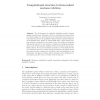696 search results - page 7 / 140 » Probabilistic-Logic Models: Reasoning and Learning with Rela... |
106
click to vote
KR
2004
Springer
15 years 5 months ago
2004
Springer
To learn to behave in highly complex domains, agents must represent and learn compact models of the world dynamics. In this paper, we present an algorithm for learning probabilist...
ICDM
2009
IEEE
14 years 9 months ago
2009
IEEE
Recently a number of modeling techniques have been developed for data mining and machine learning in relational and network domains where the instances are not independent and ide...
MAICS
2003
15 years 29 days ago
2003
Introspection is a fundamental component of how we as humans reason, learn, and adapt. However, many existing computer reasoning systems exclude the possibility of introspection b...
116
click to vote
ILP
2007
Springer
15 years 5 months ago
2007
Springer
A recurrent question in the design of intelligent agents is how to assign degrees of beliefs, or subjective probabilities, to various events in a relational environment. In the sta...
COSIT
2001
Springer
15 years 4 months ago
2001
Springer
The development of cognitively plausible models of human spatial reasoning may ultimately result in computational systems that are better equipped to meet human needs. This paper e...

